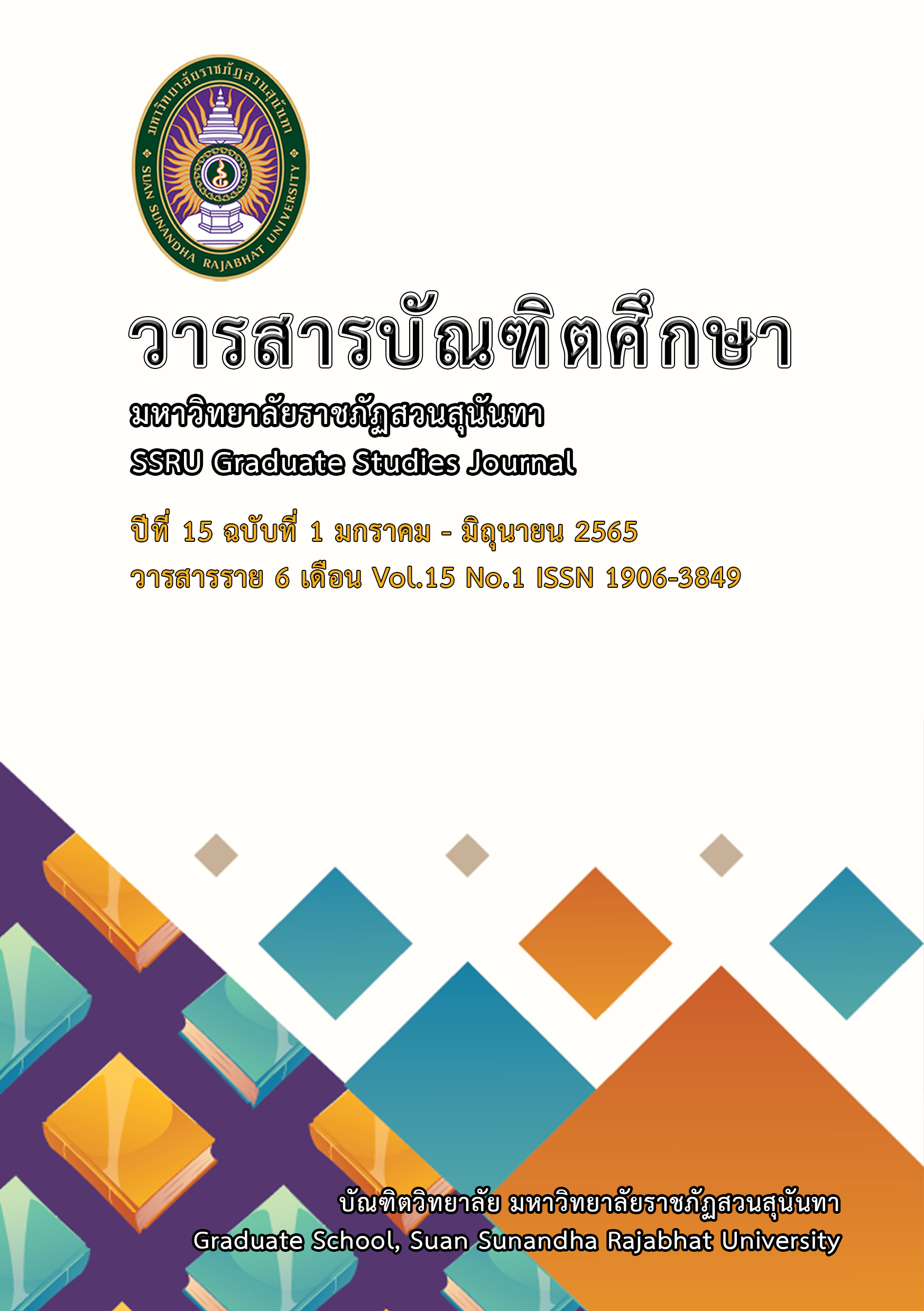A Study of Personal Characteristics and Quality of Work Life Affecting Organizational Engagement: A Case Study of an Insurance Company in Bangkok Metropolis
Main Article Content
Abstract
The objectives of this research were to study how differences in demographic information could affect organizational engagement and to examine influence of quality of work life on organizational engagement by using by using a case of an insurance company in Bangkok. This study collected the data from 316 respondents who were employees of an insurance company. They were selected via random sampling technique. Data were analyzed by descriptive statistics and the inferential statistics including t-test, One-way ANOVA with Scheffe multiple comparisons analysis, and multiple regression analysis with the significance level of 0.05
The results showed that the differences in gender, age, education level, income per month, marriage status, and work position had an influence on organizational engagement, and the quality of work life in terms of adequate and fair compensation, safe and health promotion, development of capacities, growth and stability, social cooperation integration, constitutionalism in organization, work-life balance, and society contribution had an influence on organizational engagement: with a statistical significance level of 0.05.
Article Details
References
Ahmad, S. (2013). Paradigms of quality of work life. Journal of Human Values, 19(1), 73–82.
AIA. (2021). List of AIA Thailand employee. Retrieved from https://www.signalhire.com/companies/aia-thailand/employees.
Andrew, O. C. & Sofian, S. (2011). Engaging people who drive execution and organizational performance. American Journal of Economics and Business Administration, 3(3), 569-575.
Andrew, O. C. & Sofian, S. (2012). Individual factors and work outcomes of employee engagement. Procedia-Social and Behavioral Sciences, 40, 498– 508.
Beauregard, T. A. & Henry, L. C. (2009). Making the link between work-life balance practices and organizational performance. Human Resource Management Review, 19(1), 9–22.
Bedarkar, M. & Pandita, D. (2014). A study on the drivers of employee engagement impacting employee performance. Procedia-Social and Behavioral Sciences, 133, 106– 115.
Chandani, A., Mehta, M., Mall, A., & Khokhar, V. (2016). Employee engagement: A review paper on factors affecting employee engagement. Indian Journal of Science and Technology, 9(15), 1– 7.
Chiang, F. F., Birtch, T. A., & Kwan, H. K. (2010). The moderating roles of job control and work-life balance practices on employee stress in the hotel and catering industry. International Journal of Hospitality Management, 29(1), 25–32.
Crompton, R. (2001). Gender restructuring, employment, and caring. Social Politics: International Studies in Gender, State & Society, 8(3), 266–291.
Crompton, R. & Lyonette, C. (2006). Work-life ‘balance’ in Europe. Acta Sociologica, 49(4), 379–393.
Deery, M. (2008). Talent management, work-life balance and retention strategies. International Journal of Contemporary Hospitality Management, 20(7), 792–806.
Kenexa Research Institute. (2008). Engaging the employee: A Kenexa Research Institute World Trends Report. NY : Kenexa Research Institute.
Kompaso, S. M. & Sridevi, M. S. (2010). Employee engagement: The key to improving performance. International journal of business and management, 5(12), 89-96.
Luthans, F. & Peterson, S. J. (2002). Employee engagement and manager self-efficacy: Implications for managerial effectiveness and development. Journal of Management Development, 21, 376-387.
Moen, P. & Yu, Y. (2000). Effective work/life strategies: Working couples, work conditions, gender, and life quality. Social Problems, 47(3), 291–326.
Musgrove, C., Ellinger, A. E., & Ellinger, A. D. (2014). Examining the influence of strategic profit emphases on employee engagement and service climate. Journal of Workplace Learning, 26, 152–171.
Nazir, O. & Islam, J. U. (2017). Enhancing organizational commitment and employee performance through employee engagement: An empirical check. South Asian Journal of Business Studies, 6(1), 98-114.
Saks, A. M. (2006). Antecedents and consequences of employee engagement. Journal of Managerial Psychology, 21, 600– 619.
Thakur, R. & Sharma, D. (2019). A study of impact of demographic variables on quality of work life. Productivity, 59(4), 358–365.
Vorina, A., Simonic, M., & Vlasova, M. (2017). An analysis of the relationship between job satisfaction and employee engagement. Economic Themes, 55(2), 243-262.


